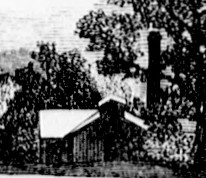
|
Chronological List of District Heating
Systems in the United States |
 |
| 1864 Vassar Gas & Steam Plant, from Historical Sketch of Vassar College (1878), page 19. |
Vassar College was the first college to install a separate heating boiler when it built a gas and steam plant in 1864.
Yale built a steam plant in 1870 and several other colleges soon followed.
Washington University in St. Louis built a steam heating system in 1878.
References
1866 "Educational
Matters: Commencement at Vassar Female College, Poughkeepsie,"
The New York Times, June 28, 1866, Page 5.
A spacious boiler and gas house supplies warmth and light to the entire
establishment. This building, whose dimensions are 84 feet by 42, is at a
distance of 400 feet from the College edifice, and covers three boilers
capable of generating sufficient steam for the cooking and laundry
service, and to warm all the rooms in the College, even in the severest
weather, by means of over 14 miles of steam-pipe, some of it at a distance
of 1,000 feet from its source, and water heated by the same agency is
carried into all parts of the College. This building also covers two
b[r]anches of gas retorts capable together of making 15,000 feet of gas a
day, with the necessary center seal purifiers and meter, and room for
storing a large quantity of coal. The amount of coal consumed in all the
operations is from 1,400 to 1,500 tons per annum. The whole system of
steam, water and gas pipes throughout the establishment, measures over
twenty miles.
1870 Yale College builds a heating plant to supply Farnam, Lawrence and Durfee dormitories,.
1873 "To
Warm Buildings," Bridgeport Standard, January 2, 1873, Page
2.
Yale College has also resorted to this mode of heating several of the
largest buildings on the college grounds. A deep excavation was made on
the corner of Elm and High streets and covered with a roof, the eaves of
which are just above the surface of the ground, like an ice house. In this
pit they generate the steam which rushes through large pipes, under
ground, like gas pipes, to the several buildings, and is distributed
through rooms designed to be heated and thus the necessity of building
fires in the buildings is avoided.
1873 "The Shame of Vassar," Springfield Republican, November 20, 1873, Page 4.
1873 “Re: The Shame of Vassar,” by John Raymond, Springfield Daily Examiner, December 26, 1873. No copy of this has been found.
1876 Historical
Sketch of Vassar College: Founded in Poughkeepsie, N.Y., January 18,
1861
Page 20: Steam and Gas House
1996 Main
to Mudd, and More: An Informal History of Vassar College Buildings,
by Elizabeth A. Daniels
Page 72: Behind Main was the gas and boiler house, situated above
the Casperkill, providing heating for Main and the Calisthenium and Riding
Academy, although not for the Observatory, where William Mitchell, Maria's
father, shivered in his basement lodgings.
Page 74: Across from the Service Building, until recently, were the
college's functioning garage and shop (built in 1930), the coal pockets
(1902), and the coal bunkers (1921). These were variously arranged in
juxtaposition to the “new” powerhouse, which was built by Lord and Co. in
1912 to accommodate the changeover from gas to electricity. President
James Taylor's report to the trustees for the 1911-12 year indicated that
underground cables for the entire college plant, a new powerhouse,
engines, dynamos, and boilers were all in the works. In 1913, Taylor again
reported on the situation, saying that everyone on campus was overworked
because of the installation of the new heating system and electric plant,
and that there were “hundreds of men |on campus] in the employ of Lord and
Co.” in the summer of 1912.
2005 "Heating Plant," Vassar Encyclopedia
© 2024 Morris A. Pierce
Si